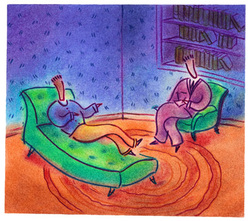
Many people are enthusiastic about the prospects of therapy, others not so much. On one hand, they may hear of the benefits from a friend or acquaintance. They may observe genuine change in someone. On the other hand, some come more at someone else's bidding. Regardless of the reasons or motivations, the realities of what is involved become daunting, can become a reason for pause, and for some, retreat. Symptoms such as anxiety or depression, or problems in relationships can invite us to seek help, but the symptoms' "nudge" may sometimes result in finding out that it is only the tip of the iceberg that leads to things that we would rather avoid. A rock-solid person who has anxiety attacks may want to stop having the attacks, but their symptoms may reveal a crack in their armor. We have defenses to protect ourselves. Let us be honest. Therapy can be threatening because it usually involves a certain kind surrender of certain defenses. However, we need our defenses. Good therapy helps us find more flexible and adaptive defenses so we can be more open and resilient, balanced by our concerns and needs for safety. Finding out why the mind and body is communicating something to restore order and balance can be emotionally uncomfortable to our normal sensibilities and need for "control." I put quotation marks around control because while we all need some control, at some level ultimate control can be so illusory. For some, these become motivations for not entering into, or continuing with therapy. Others may feel that they have no choice. All of these concerns are realistic and a part of the caring relationship that any deeper and meaningful therapy experience must address openly...
 RSS Feed
RSS Feed